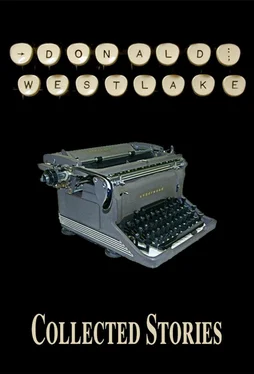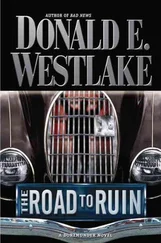Дональд Уэстлейк - Collected Stories
Здесь есть возможность читать онлайн «Дональд Уэстлейк - Collected Stories» весь текст электронной книги совершенно бесплатно (целиком полную версию без сокращений). В некоторых случаях можно слушать аудио, скачать через торрент в формате fb2 и присутствует краткое содержание. Год выпуска: 2020, Издательство: Jerry eBooks, Жанр: Фантастика и фэнтези, Детектив, short_story, на английском языке. Описание произведения, (предисловие) а так же отзывы посетителей доступны на портале библиотеки ЛибКат.
- Название:Collected Stories
- Автор:
- Издательство:Jerry eBooks
- Жанр:
- Год:2020
- ISBN:нет данных
- Рейтинг книги:5 / 5. Голосов: 1
-
Избранное:Добавить в избранное
- Отзывы:
-
Ваша оценка:
- 100
- 1
- 2
- 3
- 4
- 5
Collected Stories: краткое содержание, описание и аннотация
Предлагаем к чтению аннотацию, описание, краткое содержание или предисловие (зависит от того, что написал сам автор книги «Collected Stories»). Если вы не нашли необходимую информацию о книге — напишите в комментариях, мы постараемся отыскать её.
Collected Stories — читать онлайн бесплатно полную книгу (весь текст) целиком
Ниже представлен текст книги, разбитый по страницам. Система сохранения места последней прочитанной страницы, позволяет с удобством читать онлайн бесплатно книгу «Collected Stories», без необходимости каждый раз заново искать на чём Вы остановились. Поставьте закладку, и сможете в любой момент перейти на страницу, на которой закончили чтение.
Интервал:
Закладка:
The baby.
1960
An Empty Threat
Ah, the South Seas. Maugham heroes and the young native girls, buxom and burgeoning at eighteen, so warm, so soft, so simple and oh, so willing. Ah, the South Seas and simple youth and the soothing, sun-tanned sirens of Samoa. Ah, for romance with the charming native girls, who never never never, it seems, give birth.
And ah, the daydreams in the cold, cold winter air. With all the car windows closed, Frederick Leary shriveled in the dry warm air spewed from the heater beside his knees, and the windshield misted over. With a window open, the cold air outside reached thin freezing fingers in to icily tweak his thin nose, and the vulnerable virgins of the South Pacific receded, waving, undulating, growing small and indistinct and far, far out of reach.
And Frederick Leary was only Frederick Leary after all. Manager of the local branch of the Bonham Bookstore chain. Well-read, through accretion. A husband, but not a father. Thirty-two, but not wealthy. College-trained, and distantly liked by his employees.
Irritated, annoyed, obscurely cheated, Frederick Leary turned into his driveway, and the car that had been following him pulled to the curb three houses away. Frederick pushed open the car door, which squeaked and cracked, and plodded through the snow to push up the garage door, an overhead, put in at great expense and a damned nuisance for all the cost. And the car that had been following him disgorged its occupant, a pale and indecisive youth, who shrunk inside his overcoat, who stood hatless in the gentle fall of snow, who chewed viciously upon a filter-tip cigarette and fondled the gun in his pocket, wondering if he had the nerve.
Returning to his car, Frederick drove it into the garage. Armed with a brown paper sack containing bread and milk, he left car and garage, pulled down the damned overhead behind him, and slogged through the new-fallen snow toward the back porch. And the youth threw away the soggy butt and shuffled away, to walk around the block, kicking at the drifts of snow, building up his courage for the act.
The back porch was screened, and the slamming of the screen door made an odd contrast to the snow collapsing from the sky. Frederick maneuvered the brown paper bag from hand to hand as he removed his overshoes, then pushed open the back door and walked into a blast of heat and bright yellow. The kitchen.
Louise had her back to him. She was doing something to a vegetable with a knife, and she didn’t bother to turn around. She already knew who it was. She said, “You’re home late.”
“Late shoppers,” Frederick told her, as he put the milk in the refrigerator and the bread in the bread-box. “You know Saturday. Particularly before Christmas. People buy books and give them to each other and nobody ever reads them. Didn’t get to close the store till twenty after six.”
“Supper in ten minutes,” Louise told him, still with her back to him, and brushed the chopped vegetable into a bowl.
Frederick walked through the house to the stairs and the foyer and the front door. He put his coat and hat in the closet and trotted upstairs to wash his hands, noticing for the thousandth time the places where the stair treads were coming loose. From his angle of vision, it seemed at times as though everything in the world were coming loose. Overhead doors, screen doors, stair treads. And the cold water faucet. He left the bathroom, refusing to listen to the measured drip of cold water behind him.
And outside, the youth completed his circuit of the block. He paused before the Leary house, looking this way and that, and a phrase came to him, from somewhere, from a conversation or television. “Calculated risk.” That’s what it was, and if he played it smart he could bring it off. He hurried along the driveway to the back of the house. He could feel his heart beating, and he touched the gun in his pocket for assurance. A calculated risk. He could do it.
On Saturday and Sunday, Frederick and Louise dined in the dining room, using the good silver, the good dishes and the good tablecloth. It was a habit that had once been an adventure. In silence they sat facing one another, in silence they fed, both aware that the good dishes were mostly chipped, the good silverware was just slightly tarnished. In pouring gravy on his boiled potatoes, Frederick spotted the tablecloth again. He looked guiltily at his wife, but she ate stolidly and silently, looking at the spot of gravy but not speaking. In the silence, the cold water dripped in the sink far away upstairs, and the tarnished silver clinked against the chipped dishes.
Stealthily, slowly, silently, the youth pushed open the screen door, sidled through, and gently closed it once again. He crept to the back door, his long thin fingers curled around the knob, soundlessly he opened the door and gained entrance to the house.
Louise looked up. “I feel a chill.”
Frederick said, “I feel fine.”
Louise said, “It’s gone now,” and looked back at her plate.
In the yellow warmth of the kitchen, the youth stood and dripped quietly upon the floor. He opened his overcoat, allowing warmth to spread closer against his body. The uncertainty crowded in on him, but he fought it away. He took the pistol from his overcoat pocket, feeling the metal cold against the skin of his hand. He stood there, tightly holding the gun until the metal grew warmer, until he was sure again, then slid forward through the hall to the dining room.
He stood in the doorway, looking at them, watching them eat, and neither looked up. He held the pistol aimed at the table, midway between the two of them, and when he was sure he could do it, he said, “Don’t move.”
Louise dropped her fork and pressed her palm against her mouth. Instinctively, she knew that it would be dangerous, perhaps fatal, for her to scream, and she held the scream back in her mouth with a taut and quivering hand.
Frederick pushed his chair back and half-rose, saying, “What—?” But then he saw the gun, and he subsided, flopping back into the chair with his mouth open and soundless.
Now that he had committed himself, the youth felt suddenly at case. It was a risk, a calculated risk. They were afraid of him, he could see it in their eyes, and now he was strong. “Just sit there,” he ordered. “Don’t make any noise. Do like I tell you, and you’ll be all right.”
Frederick closed his mouth and swallowed. He said, “What do you want?”
The youth pointed the pistol at Frederick. “I’m gonna send you on a little trip,” he said. “You’re gonna go back to that bookstore of yours, and you’re gonna open the safe and take out the money that’s in it. You got Friday night’s receipts in there and you got today’s receipts, all in there, maybe five or six grand. You’re gonna take the money out of the safe and put it in a paper bag. And then you’re gonna bring it right back here to me. I’ll be waiting right here for you. With your wife.” He looked at his watch. “It’s just about seven o’clock. I’ll give you till eight o’clock to get back here with the money from the store. If you don’t come back, I’ll kill your wife. If you call the cops and they come around, I’ll kill her for that, too.”
They stared at him, and he stared back at them. He looked at Frederick, and he said, “Do you believe me?”
“What?” Frederick started, as though he’d been asleep.
“Do you believe me? If you don’t do what I tell you, I’ll kill your wife.”
Frederick looked at the hard bright eyes of the youth, and he nodded. “I believe you.”
Now the youth was sure. It had worked, it was going to pay off. “You better get started,” he said. “You only got till eight o’clock.”
Читать дальшеИнтервал:
Закладка:
Похожие книги на «Collected Stories»
Представляем Вашему вниманию похожие книги на «Collected Stories» списком для выбора. Мы отобрали схожую по названию и смыслу литературу в надежде предоставить читателям больше вариантов отыскать новые, интересные, ещё непрочитанные произведения.
Обсуждение, отзывы о книге «Collected Stories» и просто собственные мнения читателей. Оставьте ваши комментарии, напишите, что Вы думаете о произведении, его смысле или главных героях. Укажите что конкретно понравилось, а что нет, и почему Вы так считаете.








